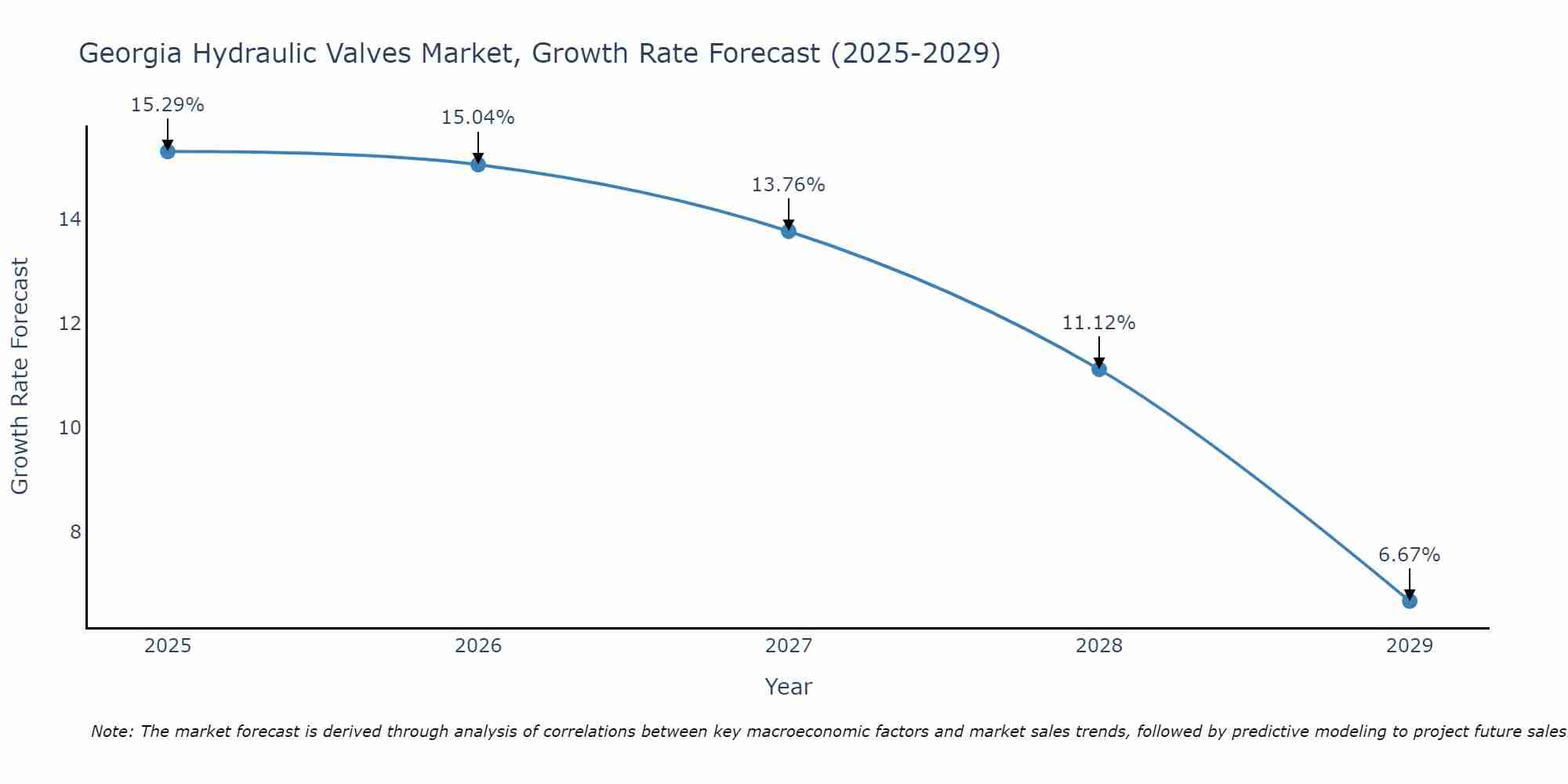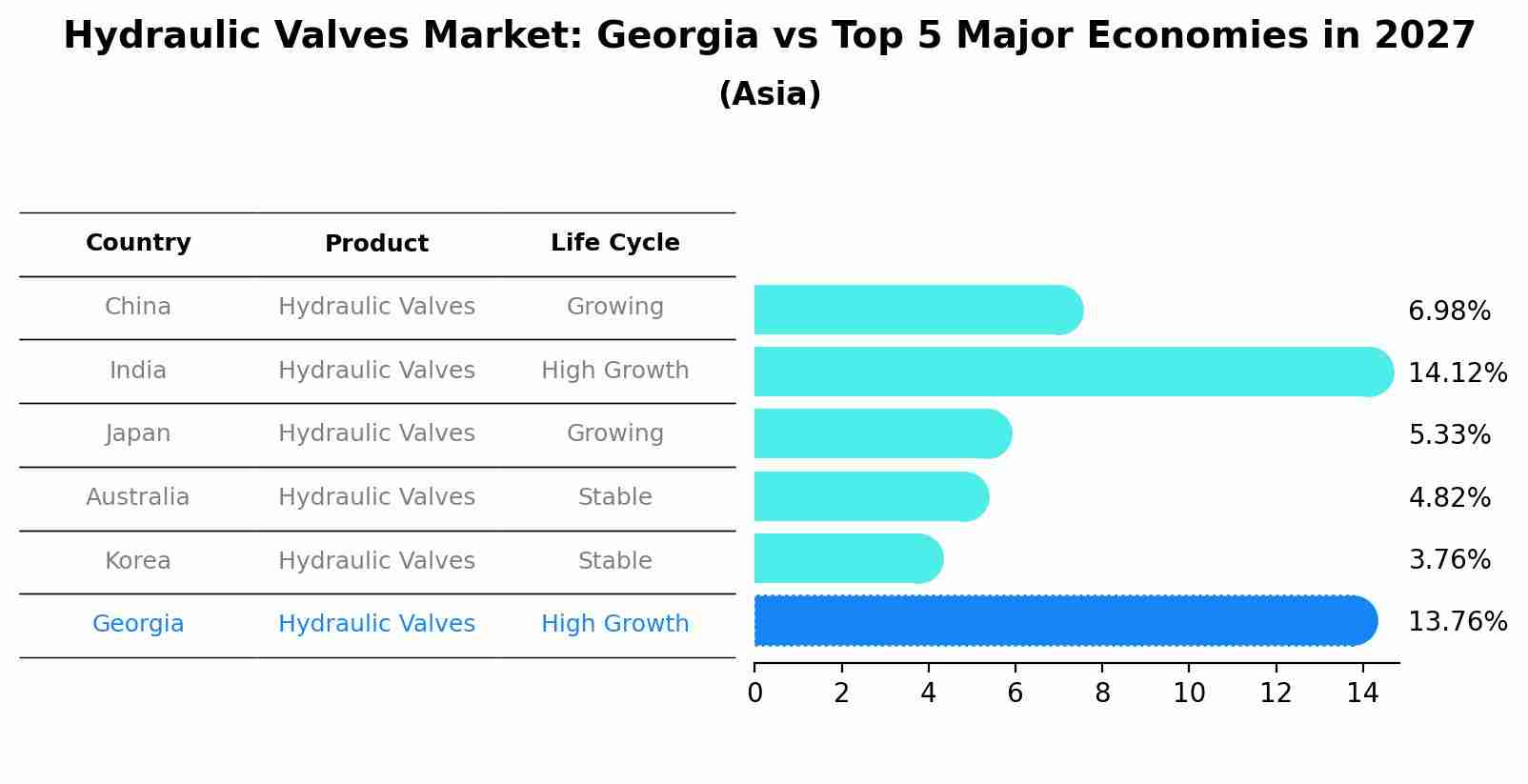Georgia Hydraulic Valves Market Outlook | Revenue, Trends, Share, Industry, Analysis, Size, COVID-19 IMPACT, Forecast, Growth, Companies & Value
| Product Code: ETC365100 | Publication Date: Aug 2022 | Updated Date: Aug 2025 | Product Type: Market Research Report | |
| Publisher: 6Wresearch | Author: Ravi Bhandari | No. of Pages: 75 | No. of Figures: 35 | No. of Tables: 20 |
Georgia Hydraulic Valves Market Size Growth Rate
The Georgia Hydraulic Valves Market may undergo a gradual slowdown in growth rates between 2025 and 2029. Beginning strongly at 15.29% in 2025, growth softens to 6.67% in 2029.

Hydraulic Valves Market: Georgia vs Top 5 Major Economies in 2027 (Asia)
In the Asia region, the Hydraulic Valves market in Georgia is projected to expand at a high growth rate of 13.76% by 2027. The largest economy is China, followed by India, Japan, Australia and South Korea.

Georgia Hydraulic Valves Market Synopsis
The Georgia hydraulic valves market is a dynamic industry that caters to various sectors such as manufacturing, construction, agriculture, and automotive. With a strong presence of key players like Parker Hannifin Corporation, Eaton Corporation, and Bosch Rexroth AG, the market offers a wide range of hydraulic valves including directional control valves, pressure control valves, flow control valves, and proportional valves. Factors driving market growth include the increasing demand for automation in industries, infrastructure development projects, and the growing agricultural sector in the region. The market is characterized by innovations in valve technology to enhance efficiency, reduce energy consumption, and improve overall performance. Additionally, the focus on sustainability and environmental regulations is prompting manufacturers to develop eco-friendly hydraulic valves to meet the evolving market demands in Georgia.
Georgia Hydraulic Valves Market Trends
The Georgia Hydraulic Valves Market is experiencing several key trends, including the increasing demand for energy-efficient and environmentally-friendly hydraulic valve solutions. There is a growing emphasis on the development of smart valves that offer improved performance and control, as well as integration with IoT technologies for enhanced monitoring and predictive maintenance. Manufacturers in Georgia are also focusing on innovation in materials and design to enhance the durability and reliability of hydraulic valves, catering to industries such as construction, agriculture, and manufacturing. Additionally, there is a rising adoption of hydraulic valves in automation and robotics applications, driving the market growth further. Overall, the Georgia Hydraulic Valves Market is witnessing a shift towards advanced technologies and sustainable solutions to meet the evolving needs of various industries.
Georgia Hydraulic Valves Market Challenges
In the Georgia Hydraulic Valves market, some key challenges include intense competition from both domestic and international manufacturers, fluctuating raw material prices impacting production costs, and the need to constantly innovate and upgrade products to meet evolving customer demands. Additionally, the market is influenced by economic factors and regulatory changes, which can create uncertainty and affect business operations. Ensuring product quality and reliability while managing pricing pressures is also a significant challenge faced by companies operating in this market. Overall, maintaining a competitive edge, adapting to market dynamics, and addressing technological advancements are critical challenges for businesses in the Georgia Hydraulic Valves market.
Georgia Hydraulic Valves Market Investment Opportunities
The Georgia Hydraulic Valves Market offers attractive investment opportunities due to the region`s growing industrial sector and increasing demand for hydraulic valves across various industries such as manufacturing, construction, and agriculture. With ongoing infrastructure development projects and the presence of key industries like automotive and aerospace, there is a steady demand for high-quality hydraulic valves in Georgia. Investing in the Georgia Hydraulic Valves Market presents opportunities for manufacturers, distributors, and suppliers to capitalize on the region`s economic growth and industrial activities. Additionally, advancements in technology and the shift towards automation in industries further drive the need for innovative hydraulic valve solutions, making it a promising sector for long-term investment and growth potential in the state.
Jordan Agar Market Government Policies
Government policies impacting the Georgia Hydraulic Valves Market primarily revolve around regulations related to environmental protection, safety standards, and trade policies. The state enforces strict environmental regulations to ensure that hydraulic valve manufacturers comply with emission standards and waste disposal guidelines. Safety standards set by government agencies aim to guarantee that hydraulic valves meet certain performance criteria to prevent accidents and ensure worker safety. Additionally, trade policies, both at the state and federal level, can influence market dynamics by imposing tariffs or promoting free trade agreements with other countries. Overall, government policies play a crucial role in shaping the operating environment for companies in the Georgia Hydraulic Valves Market by balancing economic interests with environmental and safety concerns.
Georgia Hydraulic Valves Market Future Outlook
The future outlook for the Georgia Hydraulic Valves Market is positive, with steady growth expected in the coming years. Factors driving this growth include the increasing adoption of advanced hydraulic systems in various industries such as construction, agriculture, and automotive. The demand for efficient and reliable hydraulic valves is projected to rise as industries continue to prioritize automation and productivity. Additionally, ongoing investments in infrastructure development projects in Georgia are likely to create opportunities for the hydraulic valves market. Technological advancements such as the integration of IoT and smart technologies in hydraulic systems are also anticipated to drive market growth. Overall, the Georgia Hydraulic Valves Market is poised for expansion, with a focus on innovation and efficiency driving the industry forward.
Key Highlights of the Report:
- Georgia Hydraulic Valves Market Outlook
- Market Size of Georgia Hydraulic Valves Market, 2021
- Forecast of Georgia Hydraulic Valves Market, 2031
- Historical Data and Forecast of Georgia Hydraulic Valves Revenues & Volume for the Period 2018 - 2031
- Georgia Hydraulic Valves Market Trend Evolution
- Georgia Hydraulic Valves Market Drivers and Challenges
- Georgia Hydraulic Valves Price Trends
- Georgia Hydraulic Valves Porter's Five Forces
- Georgia Hydraulic Valves Industry Life Cycle
- Historical Data and Forecast of Georgia Hydraulic Valves Market Revenues & Volume By Type for the Period 2018 - 2031
- Historical Data and Forecast of Georgia Hydraulic Valves Market Revenues & Volume By Directional Control Valves for the Period 2018 - 2031
- Historical Data and Forecast of Georgia Hydraulic Valves Market Revenues & Volume By Pressure Control Valves for the Period 2018 - 2031
- Historical Data and Forecast of Georgia Hydraulic Valves Market Revenues & Volume By Flow Control Valves for the Period 2018 - 2031
- Historical Data and Forecast of Georgia Hydraulic Valves Market Revenues & Volume By End-Use for the Period 2018 - 2031
- Historical Data and Forecast of Georgia Hydraulic Valves Market Revenues & Volume By Construction Machinery for the Period 2018 - 2031
- Historical Data and Forecast of Georgia Hydraulic Valves Market Revenues & Volume By Agriculture Machinery for the Period 2018 - 2031
- Historical Data and Forecast of Georgia Hydraulic Valves Market Revenues & Volume By Material Handling for the Period 2018 - 2031
- Historical Data and Forecast of Georgia Hydraulic Valves Market Revenues & Volume By Automotive for the Period 2018 - 2031
- Historical Data and Forecast of Georgia Hydraulic Valves Market Revenues & Volume By Oil & Gas for the Period 2018 - 2031
- Historical Data and Forecast of Georgia Hydraulic Valves Market Revenues & Volume By Power Generation for the Period 2018 - 2031
- Historical Data and Forecast of Georgia Hydraulic Valves Market Revenues & Volume By Metal & Mining for the Period 2018 - 2031
- Historical Data and Forecast of Georgia Hydraulic Valves Market Revenues & Volume By Others for the Period 2018 - 2031
- Historical Data and Forecast of Georgia Hydraulic Valves Market Revenues & Volume By Flow Rate for the Period 2018 - 2031
- Historical Data and Forecast of Georgia Hydraulic Valves Market Revenues & Volume By Below 50 L/min for the Period 2018 - 2031
- Historical Data and Forecast of Georgia Hydraulic Valves Market Revenues & Volume By 50-200 L/min for the Period 2018 - 2031
- Historical Data and Forecast of Georgia Hydraulic Valves Market Revenues & Volume By 201-500 L/min for the Period 2018 - 2031
- Historical Data and Forecast of Georgia Hydraulic Valves Market Revenues & Volume By 501-1000 L/min for the Period 2018 - 2031
- Historical Data and Forecast of Georgia Hydraulic Valves Market Revenues & Volume By Above 1000 L/min for the Period 2018 - 2031
- Historical Data and Forecast of Georgia Hydraulic Valves Market Revenues & Volume By Operation for the Period 2018 - 2031
- Historical Data and Forecast of Georgia Hydraulic Valves Market Revenues & Volume By Manual for the Period 2018 - 2031
- Historical Data and Forecast of Georgia Hydraulic Valves Market Revenues & Volume By Automated for the Period 2018 - 2031
- Georgia Hydraulic Valves Import Export Trade Statistics
- Market Opportunity Assessment By Type
- Market Opportunity Assessment By End-Use
- Market Opportunity Assessment By Flow Rate
- Market Opportunity Assessment By Operation
- Georgia Hydraulic Valves Top Companies Market Share
- Georgia Hydraulic Valves Competitive Benchmarking By Technical and Operational Parameters
- Georgia Hydraulic Valves Company Profiles
- Georgia Hydraulic Valves Key Strategic Recommendations
Frequently Asked Questions About the Market Study (FAQs):
- Single User License$ 1,995
- Department License$ 2,400
- Site License$ 3,120
- Global License$ 3,795
Search
Thought Leadership and Analyst Meet
Our Clients
Related Reports
- Afghanistan Apparel Market (2026-2032) | Growth, Outlook, Industry, Segmentation, Forecast, Size, Companies, Trends, Value, Share, Analysis & Revenue
- Canada Oil and Gas Market (2026-2032) | Share, Segmentation, Value, Industry, Trends, Forecast, Analysis, Size & Revenue, Growth, Competitive Landscape, Outlook, Companies
- Germany Breakfast Food Market (2026-2032) | Industry, Share, Growth, Size, Companies, Value, Analysis, Revenue, Trends, Forecast & Outlook
- Australia Briquette Market (2025-2031) | Growth, Size, Revenue, Forecast, Analysis, Trends, Value, Share, Industry & Companies
- Vietnam System Integrator Market (2025-2031) | Size, Companies, Analysis, Industry, Value, Forecast, Growth, Trends, Revenue & Share
- ASEAN and Thailand Brain Health Supplements Market (2025-2031) | Strategy, Consumer Insights, Analysis, Investment Trends, Opportunities, Growth, Size, Share, Industry, Revenue, Segments, Value, Segmentation, Supply, Forecast, Restraints, Outlook, Competition, Drivers, Trends, Demand, Pricing Analysis, Competitive, Strategic Insights, Companies, Challenges
- ASEAN Bearings Market (2025-2031) | Strategy, Consumer Insights, Analysis, Investment Trends, Opportunities, Growth, Size, Share, Industry, Revenue, Segments, Value, Segmentation, Supply, Forecast, Restraints, Outlook, Competition, Drivers, Trends, Demand, Pricing Analysis, Competitive, Strategic Insights, Companies, Challenges
- Europe Flooring Market (2025-2031) | Outlook, Share, Industry, Trends, Forecast, Companies, Revenue, Size, Analysis, Growth & Value
- Saudi Arabia Manlift Market (2025-2031) | Outlook, Size, Growth, Trends, Companies, Industry, Revenue, Value, Share, Forecast & Analysis
- Uganda Excavator, Crane, and Wheel Loaders Market (2025-2031) | Strategy, Consumer Insights, Analysis, Investment Trends, Opportunities, Growth, Size, Share, Industry, Revenue, Segments, Value, Segmentation, Supply, Forecast, Restraints, Outlook, Competition, Drivers, Trends, Demand, Pricing Analysis, Competitive, Strategic Insights, Companies, Challenges
Industry Events and Analyst Meet
Whitepaper
- Middle East & Africa Commercial Security Market Click here to view more.
- Middle East & Africa Fire Safety Systems & Equipment Market Click here to view more.
- GCC Drone Market Click here to view more.
- Middle East Lighting Fixture Market Click here to view more.
- GCC Physical & Perimeter Security Market Click here to view more.
6WResearch In News
- Doha a strategic location for EV manufacturing hub: IPA Qatar
- Demand for luxury TVs surging in the GCC, says Samsung
- Empowering Growth: The Thriving Journey of Bangladesh’s Cable Industry
- Demand for luxury TVs surging in the GCC, says Samsung
- Video call with a traditional healer? Once unthinkable, it’s now common in South Africa
- Intelligent Buildings To Smooth GCC’s Path To Net Zero


















